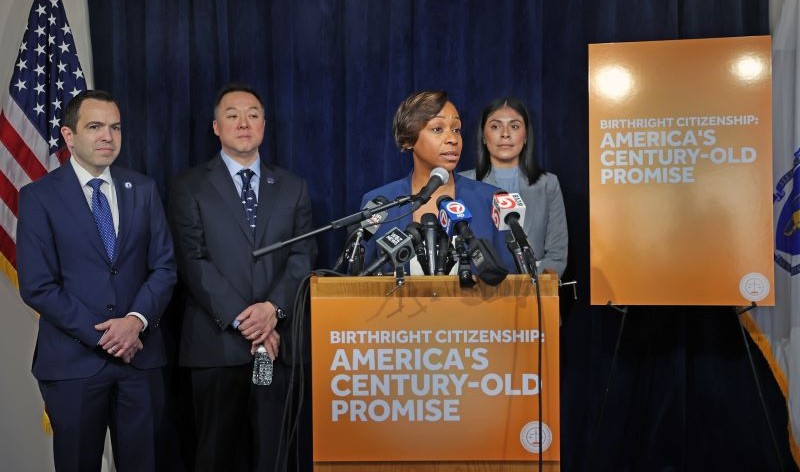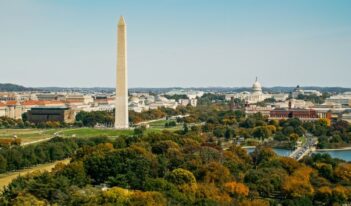
Scholars discuss the history of birthright citizenship and its modern importance.
In one of his first official acts in office, President Donald J. Trump signed an executive order declaring that the Citizenship Clause of the 14th Amendment does not grant birthright citizenship to children whose parents are not citizens or lawful permanent residents at the time of the child’s birth.
This order sparked controversy. Until recently, the doctrine of U.S. birthright citizenship was considered “well-settled law.” Attorneys general from 22 states and several advocates for immigrant rights sued the Trump Administration. And 56 percent of U.S. adults disapprove of the Trump order.
There are two primary means through which a country grants citizenship—jus soli and jus sanguinis. A jus soli, or “right of the soil,” approach confers citizenship on everyone born within the country’s territory, regardless of parents’ citizenship status. Conversely, individuals born in a country following the jus sanguinis, or “right of blood,” approach receive citizenship if a parent is a national of the country. The United States currently grants both citizenship types.
Before the U.S. Congress passed the 14th Amendment, birthright citizenship was not available to all. In Dred Scott v. Sandford, the U.S. Supreme Court infamously held that enslaved people could not be citizens, classifying these individuals as an “inferior class of beings” without “rights and privileges.” The Citizenship Clause superseded this holding after the Civil War. The Clause states that “all persons born or naturalized in the United States, and subject to the jurisdiction thereof, are citizens of the United States and of the State wherein they reside.”
Attacks on the citizenship rights of people of color persisted. Opponents of birthright citizenship argued that the phrase “subject to the jurisdiction thereof” excluded children of certain immigrant groups. In 1897, Wong Kim Ark, the son of Chinese immigrants, was denied entry into the United States—despite having been born and lived in California his entire life—on the basis that his citizenship was invalid. Ark sued, contending that he was improperly detained.
Ark’s case reached the Supreme Court and created the foundation for modern understandings of birthright citizenship. The Court held that children born on U.S. soil are citizens regardless of the citizenship status of their parents. Although subsequent legal challenges were brought after Wong Kim Ark was decided, they were unsuccessful.
Today, the future of U.S. birthright citizenship remains uncertain.
The U.S. Department of Justice argues that Wong Kim Ark does not apply to children of undocumented immigrants, as the Supreme Court relied on the fact that Ark’s parents were permanent residents. But several judges have blocked Trump’s executive order from taking effect across the country.
During one hearing, U.S. District Judge John Coughenour reportedly stated that in certain moments of history, “the rule of law becomes especially vulnerable. I refuse to let that beacon go dark today.”
Scholars predict that the birthright-citizenship debate will soon return to the U.S. Supreme Court.
In this week’s Saturday Seminar, scholars debate the historical roots of birthright citizenship and its importance today.
- In a Just Security article, Martin Lederman of Georgetown University Law Center argues that President Trump’s interpretation of the Citizenship Clause does not align with century-old understandings of the clause and is mistaken. Lederman raises two main concerns with the Justice Department’s interpretation of the 14th Amendment. First, the President’s interpretation of citizenship as being only for people who are not subject to the jurisdiction of another country is overbroad and would affect children whose parents are lawfully in the United States, Lederman contends. Second, for over a century, the U.S. government has understood that children of parents who are not U.S. citizens do not violate the citizenship laws for their birth in the United States, Lederman concludes.
- The plaintiffs in New Hampshire Indonesian Community Support v. Donald Trump argue in their reply in support of their motion for preliminary injunction that Executive Order 14,160 violates the 14th Amendment. The plaintiffs claim that several of the defendant’s arguments, including that the Amendment excludes anyone “subject to the jurisdiction of a foreign power,” were rejected by the Supreme Court in Wong Kim Ark. The plaintiffs further argue that the Trump Administration misinterprets the Amendment as requiring that a citizen’s parents be lawfully present in the United States. Finally, the plaintiffs contend that the Trump Administration’s proposed test for citizenship ignores the historical context in which the Supreme Court decided Wong Kim Ark.
- The restriction of birthright citizenship will negatively affect paths to citizenship for children of immigrants, Alex Nowrasteh argues in a recent article published by the Cato Institute. Nowrasteh points out that birthright citizenship has existed under English common law since 1608, and American courts have upheld birthright citizenship since before the ratification of the 14th Amendment in 1868. Nowrasteh argues that a path to legal citizenship, including birthright citizenship, is necessary to prevent a situation similar to Germany’s twentieth-century assimilation crisis––which increased radicalism among noncitizens before the German parliament made necessary reforms in 1999. The Trump Administration’s interpretation of birthright citizenship will generate legal chaos without clear benefits, Nowrasteh concludes.
- In a recent article in the Yale Journal of Law & the Humanities, Amanda Frost of the University of Virginia School of Law argues that birthright citizenship is a crucial aspect of the United States’ egalitarian history. Frost explains that during the antebellum period, some northern states passed birthright freedom laws that guaranteed freedom for any children born within the states’ borders. Frost notes these laws created the idea that political borders could separate a child from their parents’ legal status to foster an egalitarian society. She argues that birthright citizenship is the spiritual successor to birthright freedom, and that birthright citizenship is just as crucial for maintaining an egalitarian society now as were birthright freedom laws during the antebellum period.
- Ending unrestricted birthright citizenship would have severe consequences for immigrants and society at large, argues Sandra L. Rierson of Western State College of Law in an article in the Georgetown Immigration Law Journal. Rierson explains that attacks on birthright citizenship have occurred in all three branches of government, including claims by President Trump that he has executive authority to restrict citizenship. These attacks and rhetoric defining immigration as an invasion or infestation risk perpetuating violence against immigrants, Rierson contends. Rierson highlights the essential role that immigrants play in the American economy. Successful attempts to restrict birthright citizenship, Rierson warns, will result in more undocumented people living in the United States and the disenfranchisement of minority populations.
- A recent First Focus on Children issue brief outlines harms that repealing birthright citizenship would impose on children born in the United States. Ending birthright citizenship would create a new class of stateless or undocumented children who would be unable to access health care, nutrition, early education, or housing, First Focus on Children warns. The non-profit also contends that changing the U.S. citizenship criteria would require creating a complex bureaucratic structure that would cost taxpayers billions of dollars. Finally, First Focus on Children raises additional unanswered policy questions, including the citizenship status of children of same-sex couples, children who were conceived through in-vitro fertilization and surrogacy, and children whose paternity is disputed.
The Saturday Seminar is a weekly feature that aims to put into written form the kind of content that would be conveyed in a live seminar involving regulatory experts. Each week, The Regulatory Review publishes a brief overview of a selected regulatory topic and then distills recent research and scholarly writing on that topic.



